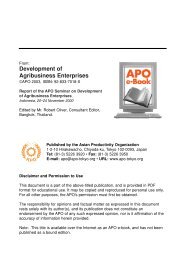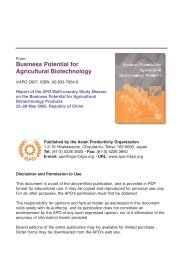Annual Report 2009 - Asian Productivity Organization
Annual Report 2009 - Asian Productivity Organization
Annual Report 2009 - Asian Productivity Organization
You also want an ePaper? Increase the reach of your titles
YUMPU automatically turns print PDFs into web optimized ePapers that Google loves.
ORGANIZATION<br />
8<br />
Secretary-General’s <strong>Annual</strong> <strong>Report</strong><br />
APO Secretary-General Shigeo Takenaka thanked the<br />
Government of the Democratic Socialist Republic of<br />
Sri Lanka for hosting this important meeting. He also<br />
expressed his gratitude to Prime Minister Ratnasiri<br />
Wickramanayaka for gracing the inaugural session<br />
and for his encouraging keynote address. He thanked<br />
Minister of Labour Relations and Manpower Athauda<br />
Seneviratne and APO Director for Sri Lanka Mahinda<br />
Madihahewa for their warm words of welcome. The<br />
Secretary-General pointed out that the GBM was<br />
being held in the midst of an unprecedented financial<br />
crisis and that no country was immune, including APO<br />
member countries. He added that the crisis was also<br />
affecting the APO specifically in relation to the budget<br />
due to the fluctuating exchange rates between the US<br />
dollar and the yen.<br />
He explained that while the amount of the total<br />
membership contributions was fixed, calculated, and<br />
paid in US dollars, most administrative expenses,<br />
which accounted for almost half of the total budget,<br />
were incurred in yen. With a strong yen, personnel<br />
and other administrative costs in US dollar terms had<br />
become significantly higher, resulting in a major challenge<br />
to the Secretariat in maintaining an appropriate<br />
balance between project and administrative costs.<br />
He also informed the meeting that there had been<br />
a nearly 14% appreciation of the yen since the<br />
Secretariat submitted the budget for the first time<br />
to the 2008 WSM in Siem Reap, Cambodia, and this<br />
appreciation had created a huge upward pressure on<br />
Secretariat administrative expenses in dollar terms. To<br />
avoid the effects of constant currency fluctuations, the<br />
Secretary-General proposed conducting a comprehensive<br />
review of administrative and staff expenses. He<br />
also suggested that the practices of other international<br />
organizations to deal with currency fluctuations be examined.<br />
As a temporary solution, the Secretariat had<br />
been exploring various cost-cutting measures including<br />
the voluntary return of staff salary at the rate of 3%<br />
for general service staff, 4% for officers and directors,<br />
and 5% for the Secretary-General effective from April<br />
<strong>2009</strong> until April 2010.<br />
The Secretary-General also reported that the Secretariat’s<br />
efforts for more effective utilization of the<br />
budget and financial discipline had led to a marked<br />
improvement in the resource utilization rate, as well<br />
as in the disbursement rate of budget for both current<br />
and continuing projects, resulting in a significant<br />
decline in the total number of continuing projects and<br />
unappropriated surplus.<br />
The Secretary-General reported that the Secretariat<br />
had followed up on suggestions made at the last GBM<br />
on establishing centers of excellence. The idea was<br />
further discussed at the 2008 WSM and at a small,<br />
informal, consultative meeting with selected NPOs in<br />
Tokyo in February. Based on those discussions and<br />
suggestions, the Secretariat proposed a pilot project<br />
focusing on business excellence with SPRING Singapore<br />
as the pioneer. Secretary-General Takenaka then<br />
expressed the hope that such a systematic approach<br />
would facilitate the transfer of learning and experience<br />
in the area of business excellence from SPRING<br />
Singapore to other NPOs.<br />
Secretary-General Takenaka (R) presenting his annual report<br />
Touching upon project evaluations, the Secretary-<br />
General stated that the Secretariat had identified<br />
areas to make them more realistic. A new project<br />
evaluation method was being finalized, with threefold<br />
emphases: greater objectivity; increased depth of<br />
coverage; and involvement of NPOs with new features<br />
including third-party evaluations and interviews with<br />
the superiors of APO project participants.<br />
The Secretary-General then turned to the Secretariat’s<br />
efforts for the development of NPOs. After the<br />
successful pilot programs for productivity and quality<br />
practitioners in Pakistan, IR Iran, and India to create<br />
a critical mass of productivity practitioners in their<br />
countries, in <strong>2009</strong> the Secretariat initiated a new<br />
project to strengthen NPOs through the development<br />
of productivity practitioners using the same modality<br />
and hoped that NPOs would take advantage of this<br />
new project under DON Implementation.<br />
The Secretary-General then detailed Secretariat<br />
efforts to add value to APO projects through its upgraded<br />
think tank role. The first edition of the revised<br />
and improved APO <strong>Productivity</strong> Databook published<br />
last year had been well received by prominent policymakers<br />
and researchers worldwide. He added that<br />
the Secretariat would initiate activities to strengthen<br />
or develop the institutional capabilities of member
















